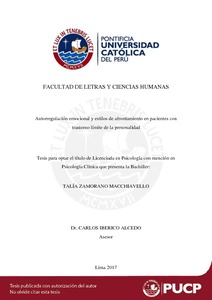| dc.contributor.advisor | Iberico Alcedo, Carlos Simón | es_ES |
| dc.contributor.author | Zamorano Macchiavello, Talía | es_ES |
| dc.date.accessioned | 2017-06-08T15:24:42Z | es_ES |
| dc.date.available | 2017-06-08T15:24:42Z | es_ES |
| dc.date.created | 2017 | es_ES |
| dc.date.issued | 2017-06-08 | es_ES |
| dc.identifier.uri | http://hdl.handle.net/20.500.12404/8762 | |
| dc.description.abstract | La presente investigación tuvo como objetivo principal conocer la relación entre
autorregulación emocional y estilos de afrontamiento en una muestra de 50 pacientes
mujeres con Trastorno Límite de la Personalidad. Asimismo, buscó conocer las
diferencias de la muestra según edad y tiempo de tratamiento. Para esto se aplicó el
cuestionario de autorregulación emocional ERQP y el cuestionario de estilos de
afrontamiento COPE. Se encontró una relación entre los estilos de afrontamiento
centrados en el problema y en la emoción, y la reevaluación cognitiva, así como una
relación entre otros estilos de afrontamiento y supresión. Más específicamente se halló
que a más edad, mayor uso de afrontamiento centrado en el problema, en la emoción, y
reevaluación cognitiva. Por otro lado, no se encontraron resultados significativos en
cuanto al afrontamiento y la autorregulación emocional, y el tiempo de tratamiento. | es_ES |
| dc.description.abstract | The principal aim of this study was to identify the association between emotional
regulation and coping skills in a sample of 50 women outpatients diagnosed with
Borderline Personality Disorder. Additionally, this study searched for differences
between ages and length of treatment among the sample. These aims were achieved
using the Emotional Regulation Questionnaire and the COPE Inventory. The results
showed a correlation between problem-focused and emotion-focused coping, and
cognitive reevaluation. They also showed a correlation between other coping strategies
and suppression. More specifically, the study found that as patients age they make more
use of problem-focused and emotion-focused coping, as well as reevaluation. On the
other hand, there were no significant results regarding the length of treatment associated
to emotional regulation and coping. | es_ES |
| dc.language.iso | spa | es_ES |
| dc.publisher | Pontificia Universidad Católica del Perú | es_ES |
| dc.rights | Atribución-NoComercial-SinDerivadas 2.5 Perú | * |
| dc.rights | info:eu-repo/semantics/openAccess | es_ES |
| dc.rights.uri | http://creativecommons.org/licenses/by-nc-nd/2.5/pe/ | * |
| dc.subject | Emociones | es_ES |
| dc.subject | Trastornos de la personalidad limítrofe | es_ES |
| dc.subject | Adaptación (Psicología) | es_ES |
| dc.title | Autorregulación emocional y estilos de afrontamiento en pacientes con trastorno límite de la personalidad | es_ES |
| dc.type | info:eu-repo/semantics/bachelorThesis | es_ES |
| thesis.degree.name | Licenciado en Psicología Clínica | es_ES |
| thesis.degree.level | Título Profesional | es_ES |
| thesis.degree.grantor | Pontificia Universidad Católica del Perú. Facultad de Letras y Ciencias Humanas | es_ES |
| thesis.degree.discipline | Psicología Clínica | es_ES |
| renati.discipline | 313026 | es_ES |
| renati.level | https://purl.org/pe-repo/renati/level#tituloProfesional | es_ES |
| renati.type | http://purl.org/pe-repo/renati/type#tesis | es_ES |
| dc.publisher.country | PE | es_ES |
| dc.subject.ocde | https://purl.org/pe-repo/ocde/ford#5.01.00 | es_ES |






